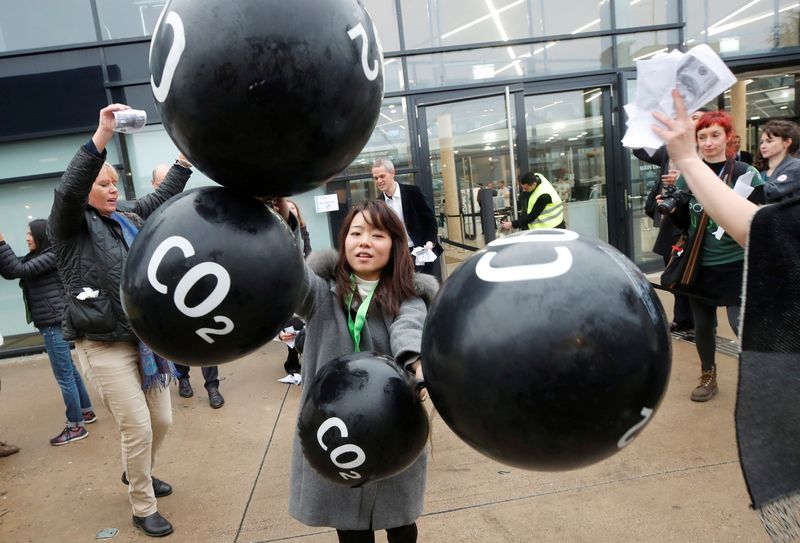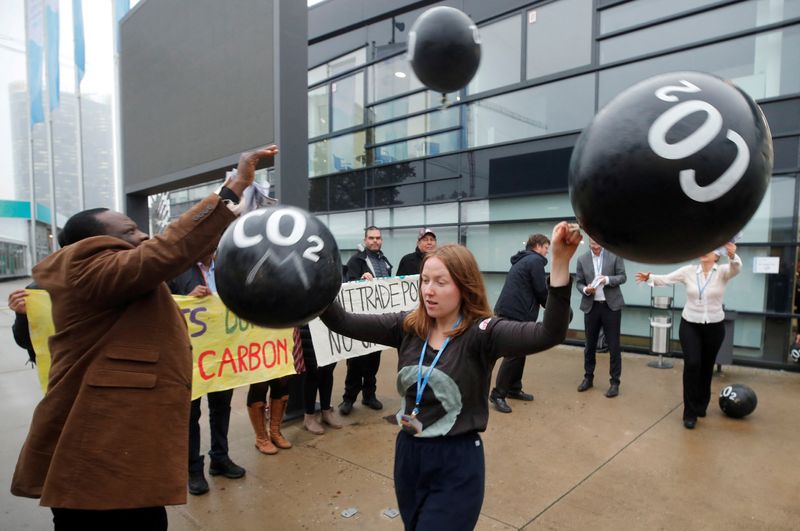By Tommy Wilkes and Virginia Furness
LONDON (Reuters) - Banks are divided over how to account for carbon emissions linked to their capital markets business, sources told Reuters, with some riled by a proposal that 100% would be attributed to them rather than to investors who buy the financial instruments.
An industry-wide methodology was due to be announced in late 2022, but four sources with direct knowledge of the process said this has been stalled by the row over how much of the carbon emissions associated with a deal should be booked by each bank.
Reaching an agreement is seen as a crucial step for the financial industry as pressure grows on it to do more to help with the transition to net-zero, with a study by United Nations scientists this week urging a rapid phasing out of fossil fuels.
Without a methodology in place, investors are being hampered in tracking the carbon footprint of individual banks, which is an increasingly important part of their shareholder remit.
Most banks are yet to reflect the emissions associated with the deals they do, which are known as "facilitated emissions", in their targets, making it hard to track their progress towards pledges to reach net-zero emissions by 2050.
At present, many banks' pledges to reduce emissions refer solely to their financed emissions.
But between 2016 and 2021, 57% of the financing provided by Europe's largest 25 banks to the top 50 companies expanding oil and gas production was through capital markets underwriting, according to ShareAction, a responsible investment NGO.
"Facilitated emissions is the way some of the heaviest emitting sectors are financing their operations, and while banks don't have as much influence as they do over lending, they still have influence," said Dan Saccardi at Ceres, a non-profit organisation focused on sustainable capital markets.
'SOMEWHERE IN THE MIDDLE'
Morgan Stanley (NYSE:MS), Barclays (LON:BARC), Citigroup (NYSE:C), Standard Chartered (OTC:SCBFF), HSBC and Britain's NatWest are among the members of a working group discussing the next steps as part of the industry-led Partnership for Carbon Accounting Financials (PCAF).
NatWest, supported by climate activist groups, is happy with 100% of facilitated emissions being attributed to the banks behind capital markets deals.
The bank says an alternative proposal of 17% derived from the Basel Committee on Banking Supervision's methodology for assessing Global Systemically Important Banks is problematic.
Tonia Plakhotniuk, NatWest Markets' Vice President, Climate & ESG Capital Markets, said that 17% risked "a mismatch" because investors would not account for the remainder themselves.
It is a "very subjective assessment to measure the role of an underwriter," she said, adding that "more outreach, research or analysis" was needed to reach an agreement.
Those favouring a lower share argue that unlike corporate loans, a bond or equity sale is a single transaction and banks have less leverage to get clients to change their behaviour.
"100% is clearly too high. We will have to meet somewhere in the middle but I don't know where," an executive at a major bank involved in the talks told Reuters.
Evan Bruner, a spokesperson for PCAF, said the group continued "to work toward a final method" but did not have any updates on progress.
'ACCOUNTING ARBITRAGE'
A few banks have begun using their own methodology.
This includes Barclays, which apportions 33% of the capital markets financing to the bank and the rest to investors.
Barclays did not respond to a request for comment.
Other banks on the working group either declined to comment or did not respond to requests for comment.
Fossil fuel bookrunners, https://www.reuters.com/graphics/CLIMATECHANGE-BANKS/zjpqjndqmvx/chart.png
Until banks agree on a compromise, experts say lenders could look to book more business as capital markets rather than loans.
"Accounting standards need to make sure that across a bank's products we are measuring emissions, and that there is no accounting arbitrage," said Simon Connell of consultancy Baringa and former sustainability strategy head at Standard Chartered.

The Basel Committee's methodology for assessing Global Systemically Important Banks considers direct lending to be six times more important in its impact on the financial system than capital markets underwriting.
PCAF uses that in its formula to reach the 17% option.
